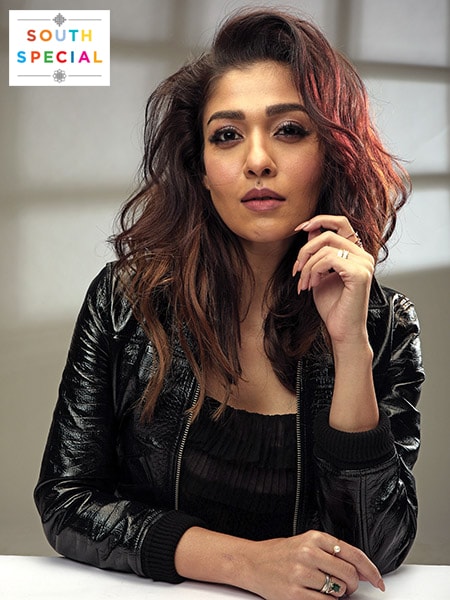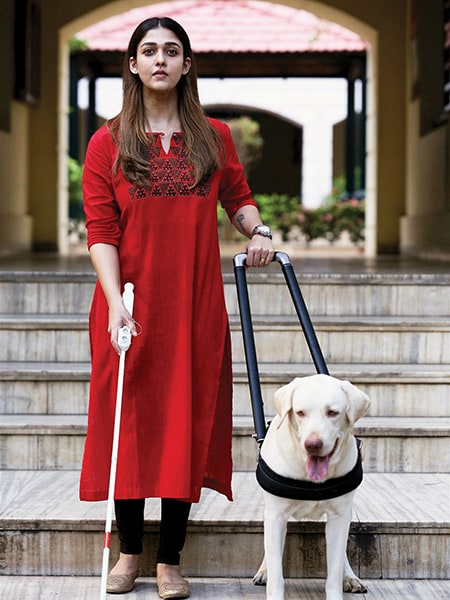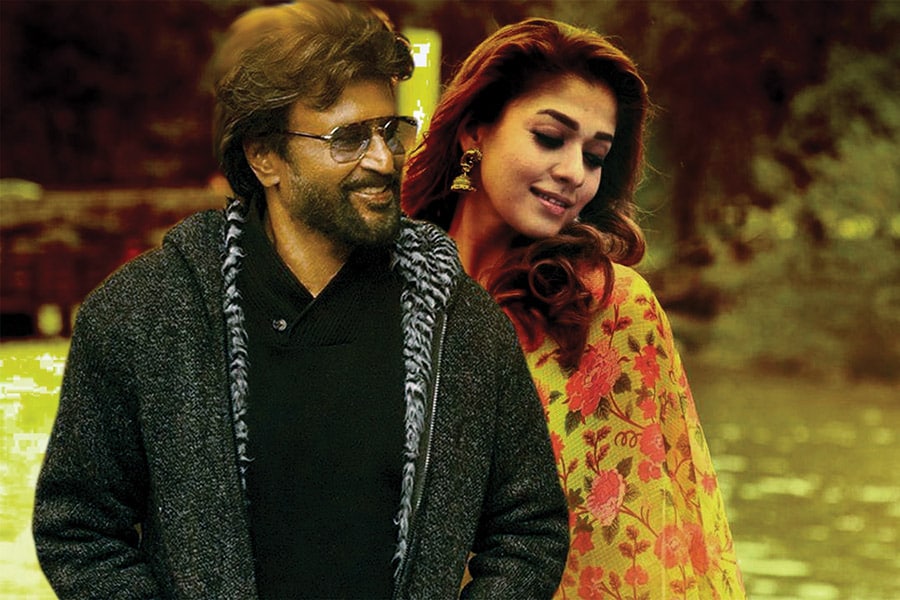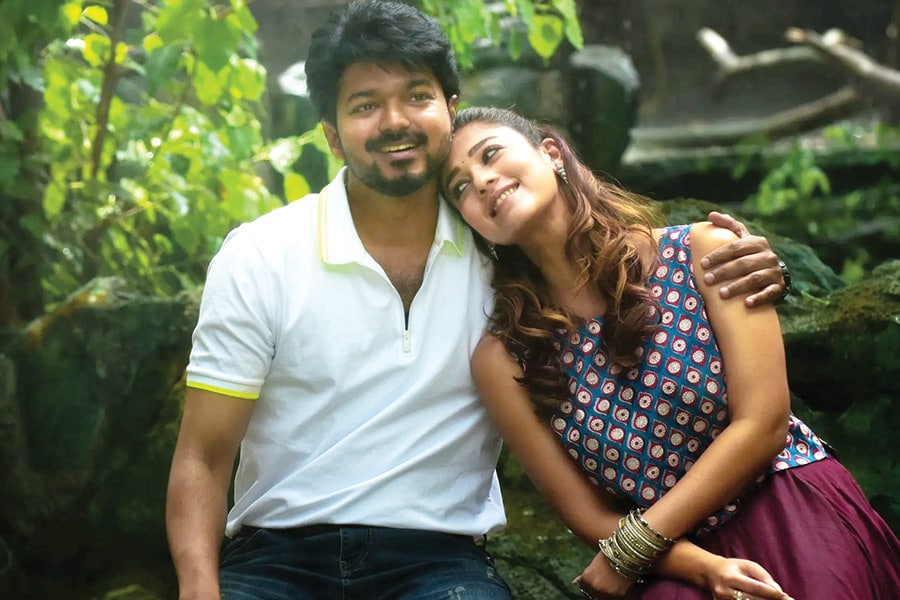Nayanthara, the unconventional superstar
Nayanthara's career enjoys unparalleled longevity and superstardom across Tamil, Telugu and Malayalam cinema. As an actor and producer who is now also dipping her toes into entrepreneurship, she is se


 Actor and producer Nayanthara
Actor and producer Nayanthara
Styling: Shaleena Nathani Makeup and hair - Namrata Soni Dress : Shehla Khan Jacket : All Staints Shoes : Christian Louboutin Rings: The Line and Jaipur Gems
Images: Selvaprakash Lakshmanan for Forbes India
Nayanthara uses the word ‘responsibility’ a lot during our long conversation. Responsibility towards her craft, the people she works with, her fans, and finally, towards herself. The actor says she does not take a single day of work for granted, and that statement rings true when she arrives ahead of time at a studio in Chennai for the Forbes India photoshoot on a Sunday morning in September. Once she faces the camera, she knows exactly what to do and what she wants, yet always takes a minute between shots to genially consult and collaborate with others in the room.
“This is the most busy I have ever been," she says, adding that she has been working round-the-clock for many years now, but the past few weeks have seen her simultaneously give her time and attention to multiple projects, across languages and genres, with each film being as big and as important as the other.
“Your accountability increases with your stardom and so does the workload. But I enjoy it, and like to be this way. This is my happy space," says the 36-year-old reticent actor, whose screen presence, during the pre-pandemic days of theatrical releases, used to draw people in by the hordes to movie halls. Writers would script whistle-worthy introduction scenes and punch lines specifically for Nayanthara, something that was earlier the preserve and privilege of male superstars.
In the wake of theatres shuttering due to Covid-19, Nayanthara’s transition to OTT has also been seamless. She has worked on three direct-to-digital film releases over the past year. Her Tamil thriller Netrikann released on an OTT platform in August to largely positive reviews. The other two OTT releases were Mookuthi Amman (Tamil) and Nizhal (Malayalam).
What sets Nayanthara apart from most male stars is her presence and popularity across all the five South Indian states. She has been consistently delivering hits across Tamil, Telugu and Malayalam languages, with a strategy that both embraces the idolatry surrounding male superstars and their films, and strives to chart her individualistic path.
 Naanthara carried the Tamil film Netrikann entirely on her shoulders
Naanthara carried the Tamil film Netrikann entirely on her shoulders
The first and the only female actor from the South Indian film industry to make it to the Forbes India Celebrity 100 List in 2018, Nayanthara’s total earnings were an estimated ₹15.17 crore. She dropped out of the list the next year, not because of a dip in earnings [she starred in seven films and did multiple endorsements in 2019], but because the rankings were calculated as a mix of earnings and ‘fame quotient’, which was the number of followers on Instagram and print media mentions. The pay disparity compared to her superstar hero colleagues also did not help. But even today, she is the highest-paid female actor in the South.
The longevity and fame Nayanthara enjoys is a huge deal, believes Baradwaj Rangan, editor, Film Companion (South). “This is a very hero-dominated industry, so for someone to last for close to 20 years, and with this kind of popularity, is frankly amazing," he says.
“Her star power is pulling people into films that they might not have otherwise watched, and that has made her what she is today."
Rangan believes the whole trajectory of the heroine in South Indian cinema is set to change. “I am not talking about people who come in just to make money for a couple of years, which is fair enough, and is a short-term goal. But I do see someone as driven as Nayanthara having a longer-term career. Particularly with the emergence of OTT, her longevity is only bound to increase."
Also, in an age where an actor’s success and influence are equated with social media following, Nayanthara’s fame is old-school organic. According to her, the enduring connection an actor has with her audience is because of the kind of films she does, the messages she gives through her work, and the way she lives her life and conducts herself off-screen. “There are a lot of people who make a fortune out of social media, which is fine, but if you say your success or your identity depends on the number of followers you have on Instagram, then something like that can be short-lived," she says. Although she is not on social media, Nayanthara’s popularity over the digital space is maintained by her loyal fan clubs across the Southern states.
 Nayanthara played the female lead in superstar Rajinikanth’s Darbar (2020). She has Annaatthe lined up with him
Nayanthara played the female lead in superstar Rajinikanth’s Darbar (2020). She has Annaatthe lined up with him
Nayanthara has now trained her focus on to an upcoming lineup of films that are likely to bolster her pan-India presence, with big-ticket projects like director Atlee’s Hindi film with Shah Rukh Khan, Kaathu Vaakula Rendu Kadhal in Tamil with Vijay Sethupathi and Samantha directed by fiancé Vignesh Shivan, and the biggie Annaatthe with Rajinikanth, which is directed by Siva. She has also signed a Telugu movie opposite Chiranjeevi, and Alphonse Puthren’s Malayalam film Pattu alongside Fahadh Faasil.
She is also producing films under the banner Rowdy Pictures that she has co-founded with Shivan, while dipping her toes into entrepreneurship by investing an undisclosed amount in Chennai-headquartered beverage brand Chai Waale, and exploring ventures in the beauty and wellness space. It is too early to reveal details of the latter, she says.
Her plate is full, but she is hungry for more. “I can never reach a stage where I feel like I have done everything," she says. “I have spent 18-19 years in the film industry, but I do not think about it, because it is always about what more I can do, how much more I can learn and which new beginnings I can make. Even after so many years, when I am on a film set, every day seems like my first and I can never get enough of it."
Nayanthara was barely 18 when she gave her first shot for Sathyan Anthikad’s 2003 Malayalam film Manassinakkare, and she recollects being clueless about how anything in the film industry worked. She had no idea what a ‘mark’ is [a tape or a marker on the floor that lets an actor know where she is to position herself for a scene] or how to deliver her dialogues. “Hundred instructions are given to you for one shot and you have to do these 100 things at the same time," she says, laughing at the recollection.
The decision to work in films had not been intentional, but rather serendipitous. Named Diana Mariam Kurien, Nayanthara’s childhood was spent in Bengaluru, Gujarat and Delhi as she moved cities on account of her father’s job in the air force. It was when she was pursuing a degree in English literature in her hometown Thiruvalla that director Anthikad discovered her in a magazine that published her photographs after she won a contest. “I have a very private, close-knit family and I have always been a little girl for my parents. In fact, my mom and dad used to accompany me to the film set every day till my third film, after which they were confident that I can manage on my own," Nayanthara says.

While she decided to go with the flow, before she could realise it, Nayanthara got her second film offer while shooting for the first schedule of her first film. This time, it was director Fazil calling her for the film Vismayathumbathu starring Mohanlal. Her performance in both these films was noticed and appreciated by critics. She soon signed her third Malayalam film Natturajavu.
“I had no time to think. I shot three films over those four-five months," she says. In 2005 came her pivot to Tamil cinema with the film Ayya alongside Sarath Kumar, and then came her breakthrough role where she was paired opposite Rajinikanth in his film Chandramukhi. “It was only after those 5-6 films, working with some of the best directors and actors in the business, that it struck me that acting had become my career choice, something I will be doing for the rest of my life," Nayanthara says.
The next few years were a steady climb up the ladder of fame, where Nayanthara experimented with a variety of characters, ranging from a glamorous turn in the Ajith-starrer Billa to an earnest, performance-driven titular role in Shyamaprasad’s Malayalam film Elektra.
She also ticked the boxes of starring in commercial hero projects alongside superstars like Vijay, Mammootty, Venkatesh, Nandamuri Balakrishna, Suriya and Nagarjuna, though her roles in most of these films were largely those of the token female lead. She even starred in the Kannada film Super opposite actor Upendra, which is her only film in the language to date.
Then, in 2011, she went under the radar on a self-imposed hiatus for almost a year, a period of reflection and self-awareness that gradually led to a moment of reckoning, and built the foundation for the rise of an actor who would eventually become the ‘lady superstar’ of the South Indian film industries where films with her as the solo lead would go on to have ‘housefull’ boards, 6 am shows, tickets selling in black and widespread theatrical releases across hundreds of movie screens.
“When there is a low phase in your life, you have to pick yourself up and start again. What I did was believe in myself, have faith in God and in the power of the universe," says Nayanthara, who believes that life is all about overcoming your fears. “There is no strategy or plan, just a lot of hard work, dedication and determination."
Rangan believes that in her second coming, Nayanthara worked really hard on how she looked and presented herself. “She also maintained her exclusivity by not giving any media interviews and not sharing too much about her life in the public space," the National Award-winning film critic explains. According to him, the actor also carefully balanced quirky or offbeat smaller films like Kolamavu Kokila, Aramm or Imaikka Nodigal—where the entire script revolves around her and the gender of the protagonist becomes incidental—alongside appearances in commercial superstar projects.
This time around, however, even in the mass superstar vehicles, she was not essaying just a token role anymore. Consider a scene from the Vijay-starrer Bigil in 2019 where a conservative man is against the idea of his wife pursuing her ambition of becoming a footballer. In any other film, one would have expected Vijay’s character Michael to explode into an angry monologue, but instead it is Nayanthara’s character Angel who takes over, asserting the need to support and encourage a woman’s passion, dreams and her individuality. For a Vijay film where the ‘Thalapathy’ [Emperor] of Tamil cinema is almost always at the front and centre of every emotional, high-impact scene, this was unconventional for the female lead.

“Even in Viswasam (2019) opposite Ajith, it is Nayanthara’s pride and her vulnerability that drive the plot forward," says Rangan. “This is both a combination of changing times as well as the fact that Nayanthara commands the power on-screen to deliver strong scenes. You might not buy the same scene from anybody else." According to Rangan, the fact that she adds the required shades of vulnerability to tough roles is what makes the audience root for her.
While Nayanthara says she wants to make sure that even her ‘women-centric’ films [a tag she hopes is done away with soon] are not preachy but entertaining, and pick scripts that would work irrespective of the protagonist being male or female, critics believe this widens the appeal of her films to audiences across ages and sexes, particularly youngsters.
At the top of her game, the actor credits her family—parents, brother, sister-in-law, two nieces and Shivan—for shaping her work ethic. “Vignesh [Shivan] is the biggest blessing of my life. He makes my life complete," she says. According to Nayanthara, her mother, a homemaker, has taught her perseverance, patience and multitasking, while her father, an air force officer, has taught her discipline and punctuality. “My family is not star-struck. For them, what I do is like any other profession. That keeps me grounded," she says. “My brother is in Dubai and has been extremely supportive of my career. He and I make sure we balance our schedules to spend as much time as possible together with family. At home, I am just my parents’ daughter."
As an actor, Nayanthara is known to give opportunities to younger, emerging filmmakers, and the latter admit that as a result of her coming on board, their projects reached heights they themselves had neither imagined nor aimed for. A case in point is Ashwin Saravanan’s horror film Maya (2015), which was one of the first films to have Nayanthara as a solo lead without a male hero, and which marked the beginning of a series of experimentations by the actor to reinvent herself on screen and go against the grain.
“I wanted to make Maya as a small indie project, and it was not meant to be the kind of film you see today. In fact, I was hesitant to approach Nayanthara since I felt the material might not do justice to a powerhouse talent like her," says Saravanan, who later went on to make Game Over starring Taapsee Pannu. “But she did agree and once she is on board, she is a thorough professional who takes your film to another level and makes your job incredibly easy."
The filmmaker says that throughout the shooting of the film, Nayanthara was never late on set. If they wanted to start shooting at 6 pm, for instance, she would be ready with her costumes and makeup by 5.50 pm. Made on a budget of less than ₹10 crore, the film went on to gross more than ₹45 crore at the box office.
Shivan, who started dating Nayanthara after they worked together in Naanum Rowdy Dhaan (2105), agrees with Saravanan that Nayanthara’s professionalism has a ripple effect on the work culture of the entire set. “When it comes to films, time is money. She is one of the most sincere artistes I have ever worked with always prompt on set, which saves so much time for a unit that is ready to shoot."
 A still from Atlee’s 2019 Tamil sports drama Bigil, starring Vijay and Nayanthara
A still from Atlee’s 2019 Tamil sports drama Bigil, starring Vijay and Nayanthara
Getting feedback and inputs from Nayanthara improve his confidence as a filmmaker and a lyricist, expands his worldview and motivates him to work better, says Shivan, adding that her ability to fit seamlessly into a role, “be it an amman [goddess] or a glamorous character", is one of the main reasons for her to sustain in the industry for close to two decades.
As a producer, says Shivan, Nayanthara brings in a strong sense of judgement and experience that helps the duo successfully pick projects, like Koozhangal (Pebbles), their debut production venture. “I am a commercial filmmaker with limited sensibilities, so I was not really interested because it was an art-house kind of film. But Nayan took the call to back the film as she felt it would go places," says Shivan.
Soon enough, the film, directed by debutant PS Vinothraj, won the Tiger Award, the top honour at the 50th edition of the International Film Festival Rotterdam in February. “There has never been a Tamil film that has captured the vastness of rural life in a more austere, art-house fashion," read a review by Srivatsan S in The Hindu in February.
For Rowdy Pictures, Nayanthara says she and Shivan take collective decisions. She wants the production venture to “tell lots of good stories" in the future too, without sticking to one genre or making safe bets.
Netrikann, produced by Shivan under the Rowdy Pictures banner and directed by Milind Rau, saw Nayanthara playing a visually challenged ex-Central Bureau of Investigation (CBI) officer who tries to get the better of a perverted man responsible for a spate of kidnapping and sexual assaults on women.
The film, which Nayanthara carried entirely on her shoulders, has its moments. The character Durga, in all her vulnerability and courage, helps other women fight their fears, and even tells off the antagonist with a monologue that asserts a woman’s right to live life her way, wearing whatever she pleases and doing whatever she wants.
The actor, who often goes by her “gut feeling" while picking acting projects, says she hopes there comes a time when women demanding their worth, “be it in terms of the kind of roles written for us or the remuneration we are offered", is not something that needs discussion and instead becomes a default way of being.
Nayanthara never really pauses to think about the magnitude of her popularity, but is cognisant that she is in a position where her actions can influence people, particularly women. She takes this seriously, both on screen and off screen, be it by standing up against male actors and filmmakers who make misogynistic comments about women in the industry, or seeking out films that portray independent women taking charge of their lives. “I want young girls and women to aspire for and achieve more," she says. “This is a responsibility that comes with my fame."
First Published: Oct 12, 2021, 14:12
Subscribe Now